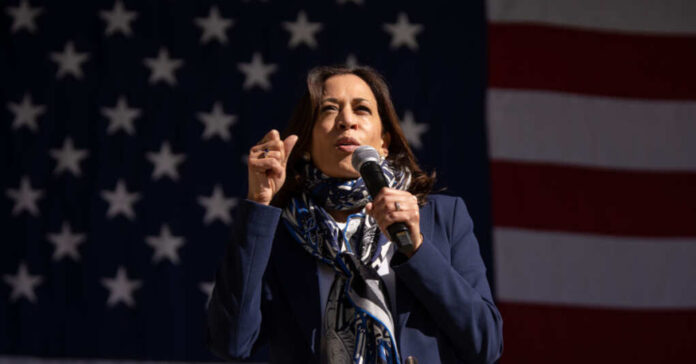
In a bid to address mounting frustrations within the Democratic Party, Vice President Kamala Harris has intensified her involvement in President Joe Biden’s reelection campaign. Democratic leaders, including Governors Gretchen Whitmer (D-MI), J.B. Pritzker (D-IL), and Wes Moore (D-MD), have voiced concerns during weekend meetings at Harris’s Naval Observatory residence, prompting the Vice President to take a more active stance.
Acknowledging the expressed frustrations, Harris, ever the keen listener, has embarked on a journey to actively engage with Democratic leaders, attempting to burst the campaign’s “information bubble.” Despite her commendable efforts to coordinate with fellow Democrats, it’s like watching a magician pulling a rabbit out of a hat – impressive, but where’s the substance?
While Harris may bask in the applause for her newfound proactive stance, leading Democrats are left wondering if it’s all smoke and mirrors. The pervasive sense of stagnation among party members has become a not-so-subtle elephant in the room, with concerns growing like wildfire about a potential Democratic downfall in the looming November elections. It’s almost as if Harris is attempting to steer a ship without a compass – commendable enthusiasm, but is there a clear direction?
During these discussions, Governor Whitmer criticized the administration’s approach to discussing abortion rights, revealing a notable source of discontent. Governor Pritzker expressed frustration over the campaign’s perceived failure to challenge Republicans and former President Trump on opposing the Senate’s bipartisan immigration bill.
A critical concern is the diminishing support from young voters for both Biden and Harris, with criticism centered around their perceived inaction on issues important to younger demographics, such as the protection of Palestinians in Gaza.
Despite expressing confidence in Biden’s chances against Trump, Harris is wary of potential complacency, emphasizing the risk of losing “to the couch.” The negative perception surrounding Harris has led Republicans to caution voters about the possibility of her assuming the presidency if Biden is reelected.
Responding to these challenges, Harris has increased her involvement in the campaign, actively listening and implementing changes based on feedback from prominent Democratic figures. However, this move carries risks, as Republicans stand ready to capitalize on missteps.
The importance of Vice President Harris strengthening outreach efforts to key constituencies and tailoring campaign messaging and policies accordingly cannot be overstated. Democratic leaders have voiced frustrations over missed opportunities and a perceived failure to capitalize on the achievements of the Biden-Harris administration.
Harris has pledged to adopt a more hands-on and engaged approach to the campaign to address these concerns. By actively listening to feedback and involving prominent figures like Governors Whitmer, Pritzker, and Moore, she aims to build a coalition of influential voices within the Democratic Party, ensuring diverse perspectives and fostering unity.
Furthermore, in a sudden revelation, Harris has pledged to embark on a grand mission of strengthening outreach efforts to key constituencies, as if she stumbled upon a political treasure map. It’s almost as if she’s just discovered the existence of communities of color, women, young voters, and working-class Americans – a groundbreaking revelation for someone holding the second-highest office in the land.
Her commitment to tailoring campaign messaging and policies to address specific needs and concerns within these demographics has the air of a seasoned chef claiming to have just discovered the importance of seasoning. One might wonder if this newfound understanding is genuine or just another attempt to sprinkle a dash of sincerity into a political pot lacking flavor.
As Harris unveils her grand plan for demographic engagement, it’s reminiscent of a last-minute scramble to check off boxes rather than a well-thought-out strategy. The need to address specific concerns within these demographics has been glaringly apparent for quite some time, making one question the sincerity behind Harris’s sudden enlightenment.
Kamala Harris’s steps to reshape the Biden-Harris reelection campaign demonstrate a commitment to unity and effective communication within the Democratic Party. As the campaign progresses, her initiatives aim to revitalize messaging and reconnect with disillusioned or overlooked voters. The impact of these efforts remains to be seen, but Harris’s new determination to address concerns head-on signals a long lost leadership stance in the face of Democratic Party frustrations.















